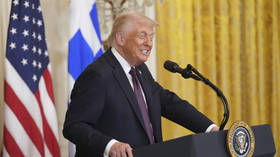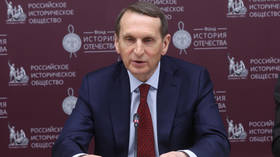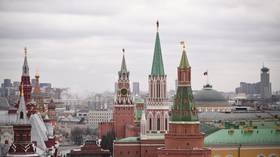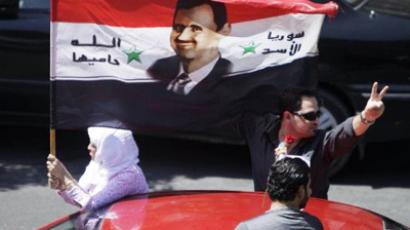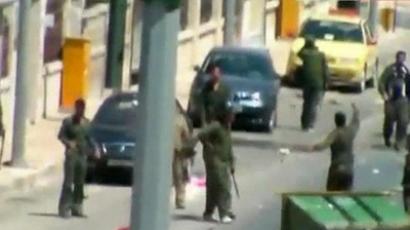‘We’re building our own Arab democracy’ – Syrian presidential aide
Russia and China vetoing the harsh resolution on Syria in the UN marks a new political force equal to the West stepping on to the international stage, believes political and media adviser to Syria’s President Bashar Assad, Dr. Bouthaina Shaaban.
The UN Security Council has failed for the third time to adopt a resolution criticizing Syria, as Russia and China used their powers of veto. RT talked to Dr. Bouthaina Shaaban about Syria’s beleaguered situation.RT:How do you assess the position taken by Russia in the Security Council, to block the resolution criticizing Syria? What information did Syrian authorities gave Russia to support its position?Bouthaina Shaaban: We welcome the positions taken by Russia and China and their use of the veto in the interests of Syria and its people. The information provided was just about the reality of the state of affairs. The point is that decisions taken by Western countries are based not on real events in Syria, but rather on the task of suppressing Syria as an Arabic state that plays an important role in resistance. At the same time, unfortunately they draw conclusions from reports by a few self-seeking Arabic media outlets who act as their accomplices in covering violence and crime committed by terrorists and militants in Syria.RT: Now that another attempt at adopting a tough resolution against Syria has failed, what do you expect the international community to do in order to exert pressure on Damascus?BS: I believe that October 5th, 2011, when Russia and China blocked the UN resolution, was a historic day. And I hope it will be remembered. The fact that Russia and China used their veto for the good of the people has enabled us to feel, for the first time, that there is a different force in the world, one that stands for justice, neutrality, culture and civilization – and this force stepped onto the international stage to stand equal to Western power. I personally believe that the future belongs to the East, to Russia and China. It is a crucial moment in history, when a new force has emerged to say to the West, “You are wrong.” And the West is definitely wrong, because its leaders share a colonialist attitude, not only regarding Syria, but toward the entire region.RT: What do you think the international community will do next?BS: I don’t think the international community has many options. A new force, supporting reform and pluralism in Syria, has appeared in the international arena. That’s the path we follow. The majority of laws that should’ve been passed are now adopted. Work to amend the constitution is underway. We’re moving forward towards reform and pluralism. The problem is that some states fund and arm terrorist groups operating in our towns and villages. This makes ordinary people’s lives very difficult, and puts them in real danger. The position of the Western countries encourages these terrorist groups.RT: You recently visited Moscow and the Russian authorities assured you again that dialogue was the only way out of the crisis that Syria finds itself in. Will you invite all local opposition forces, or even public representatives, to a dialogue in which all levels and sides of the Syrian population could participate?BS: We did invite them. I personally met with a number of opposition representatives, and so did many members of the Syrian government. When we suggested that they should participate in the dialogue, some accepted this proposal, and others didn’t. But Syria doesn’t have just one opposition, but many opposition movements. Representatives of most these movements were present at joint conferences and a consultation meeting chaired by Mr. Farouk al-Sharaa, while others ignored it. I don’t understand what reforms they want to see without entering dialogue. We share Russia and China’s view that it’s impossible to move forward without dialogue. The path of discussion is the path of reform. The alternative is blood-spilling, civil war and inter-religious clashes. And this isn’t at all what Syrian people need. It's up to the Syrian opposition to protest against foreign interference. The opposition should participate in dialogue with the goal of reform and building a new, better Syria. It shouldn’t listen to those who would turn it against dialogue with the government.RT: The National Council was established in Istanbul. What do you expect from this organization? If it gets international recognition would you expect something similar to the events in Libya? If the emphasis is made on protecting civilians, could this be used as a pretext for a military operation, or international interference?BS: I believe that’s all in the past. A thousand people cannot speak for 23 million Syrian citizens. I am speaking on behalf of many opposition activists who are Syria patriots, and they say that most members of this Council belong to the Muslim Brotherhood. These people don’t represent Syria or its people. How can you position yourself as a representative of the Syrian people when you’ve spent the last 30 years living in Paris? It just doesn’t work that way. I don’t think they will share a future with the people of Syria.RT: Are the [Syrian] Armed Forces split or are they still united?BS: Both the Armed Forces and the state are united. All these rumors are being framed up like the case of Zainab al-Hosni. Two weeks ago I gave an interview to the BBC. I was mainly asked how I could protect women’s rights without appearing on satellite channels to defend Zainab al-Hosni, who was allegedly tortured and killed by Syrian security services. I have no doubt that you saw Zainab al-Hosni on TV and confirmed she was safe and sound. So all the rumors about her were a lie. Today, lies in the media have gone beyond common sense. Some Arab television channels have lost all shame and professionalism. But the Almighty Allah shows them what they are doing. Thanks to Allah, the truth speaks for itself every day.RT: Some say the delay in the UN gives Syrian leaders time to improve things in the country. Will the military presence across the country be rolled back?BS: We wouldn’t mind if the security forces’ mission ended today. Do you know what I heard from my relatives in Homs who phoned me at 11pm last night? They said that 55 people, representing different religious communities, had been kidnapped in just one day. They’re abducting people of various creeds in order to sow sectarian hatred in Homs. And what are we, as a responsible government, expected to do to safeguard the security of citizens? What would you do in our place? Would you just abandon these people or would you send law enforcers to fight the terrorists? You’d better address this question to those who are arming the gangs and seeding evil in our country. That doesn’t mean we should give up our campaign against corruption, stop government reform or revolutionary change in the spheres of culture and education. Our people are demanding all this and it’s necessary for Syria’s prosperity. But terror, and direct or indirect Western support for terror, is impeding reform, while the positions of Russia and China are stimulating them. They’re giving the Syrian people a chance and helping them follow the path of change so that Syrians can have better lives in their own country.RT: Some analytical articles in the Western press say that the situation in many parts of Syria, including the town of Homs, looks very much like a civil war. Do you have such fears?BS: Yes, I do. We, who are representatives of various communities, religions and ethnic groups, live together in Homs. We’ve been living as one family throughout history. Syria is a diverse country. It’s the cradle of three world religions. Our main task was to continue living in love and peace. The United States used its veto right 50 times to deprive the Palestinians of their legitimate right to create a state on their land. Isn’t that a violation of human rights? Eleven thousand inmates are languishing in prisons of the occupying regime. In this way, this state is trying to dismember the region into small mono-ethnic and mono-religious states. This is its plan. Look what’s happened in Sudan and what’s happening in Libya and Iraq. Our peoples and our land are in their sights. All this is aimed against our civilization, culture and identity. Even when we build democracy, we build our own Arab democracy, based on our own religious, cultural and civilizational values – of which we’re proud. I don’t want to be a Western man’s replica. I am proud of being Arab. I like being an Arab woman. Whether Muslim or Christian, I am an Arab woman first. I speak Arabic and I want my culture, my mind and my clothes to reflect my national identity, while the West wants us to become facsimiles of what they call Western democracy, we, the Arabs, can hardly make ends meet, while Israel dominates the Middle East. All this is well-known. We realize this looming threat and so do the residents of Homs. And those who sow discord –you’ve seen their photos – extremists, zealots and terrorists, whatever crimes they commit, will never enlist our people’s support.RT: Dr. Bouthaina Shaaban, the political and media adviser of the Syrian president, thank you very much for your interview. BS: Thank you very much. I would like to thank once again the leadership and people of Russia for their wise decision that contributes to the cause of defending Syria and its people. Let me express my gratitude on their behalf. This helps the Syrian people to return their genuine Arab look to our region. Thank you once again.






